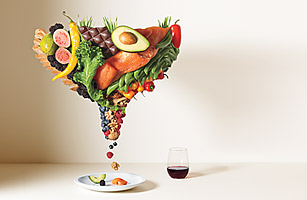
Restricting calories extends animal life, so doctors want to know if going hungry would help us too.
(2 of 2)
Volunteers for the CALERIE study — all of whom must start at a reasonably healthy body weight — first determine their resting metabolic rate, or the number of calories they tend to burn in a day. That figure is then reduced 25%. (In animal studies, the sharper the calorie cut, the greater the impact on aging, but 25% was chosen as a level that could be effective but still realistically achievable in humans.) For the first month, the subjects get precooked meals that provide them with all the calories and nutrients they need and no more. After that, they design their own menu, though they receive frequent checkups.
The meals that the participants eat aren't unusual. Apollos, whose new daily limit is 2,408 calories — as an active trainer, his limit is unusually high — had room for a couple of pieces of fudge to go with his grilled-chicken salad at a recent lunch. Instead of reducing the portion size, people tend to switch to low-calorie, high-satiety diets — lots of fruits, vegetables and fiber — that help quell hunger. "It's a lot of normal food," says Rachel Murray, another CALERIE volunteer. "You just have to plan what you're eating."
The dieters lose weight almost immediately, usually reducing their body mass about 15% in the first year before plateauing. And they reap the expected health benefits: cholesterol and blood pressure drop precipitously. What intrigues CALERIE researchers, though, is the possibility of less expected benefits — for example, any reduction in the protein IGF-1 (which helps regulate aging) similar to that found in studies of calorie-restricted animals. "We'll be able to see whether calorie-restricted humans undergo the same adaptation," says Dr. John Holloszy, a professor of medicine at Washington University and a lead researcher on the CALERIE study.
Even if it turns out that calorie restriction can slow the human aging process, there's ample reason to doubt that severe dieting will ever be a realistic option for most people. In contemporary America, where calories are cheap and plentiful, cutting back 25% means almost constantly saying no. Alcohol is largely out, and dining with friends who aren't denying themselves would become a chore. There are some side effects as well: it's harder to maintain a very active lifestyle on a restricted diet, and libido often ebbs. Given the risk of eating disorders, especially among teenage girls, responsible doctors would be wary of recommending so obsessive a regimen. Even members of the Calorie Restriction Society, a group formed in the mid-1990s by people interested in the benefits of semistarvation, doubt their diet will work for many people. "A lot of people think this is crazy," says Brian Delaney, the society's co-founder, who believes that calorie restriction is probably unsuitable for the broader population. "I wouldn't want to advocate it."
Still, studying calorie restriction should shed valuable light on the biology of aging, and anything we understand better we have at least a shot at controlling better. As for Apollos, who has 16 months to go on the CALERIE study, he has grown fond of abstention and says he wants to continue the diet even after the experiment is over. His improved health is, by itself, a form of renewed youth. But getting some extra years would be an even better one.